December 8, 2023
Air Date: December 8, 2023
FULL SHOW
SEGMENTS
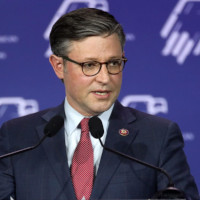
House Republicans Oppose Environmental Justice
View the page for this story
The very first bill that Speaker Mike Johnson passed through the House would gut many energy and climate projects funded by the Inflation Reduction Act, even though Republican states are massively benefiting from this funding. The repeal would also block environmental justice efforts and deny a “just transition” for disadvantaged communities. Opinion writer Derrick Jackson joins Host Steve Curwood to discuss what he calls racist and hypocritical elements of the House GOP agenda. (10:38)

Beyond the Headlines
/ Peter DykstraView the page for this story
This week, Living on Earth Contributor Peter Dykstra joins Host Jenni Doering with an “underground” success story about the rediscovery of a rare species of golden mole with some help from a border collie. Also, a jetliner recently flew across the Atlantic powered by waste fats and sugars. And in history, they look back to the creation of Superfund in 1980 to clean up toxic waste. (04:19)
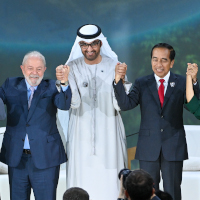
UN Climate Summit COP 28 Update
/ Steve Curwood and Jenni DoeringView the page for this story
As the UN Climate Summit in Dubai heads towards its scheduled final day on Tuesday, December 12, delegates have yet to achieve consensus for the Global Stock take. That’s a report on progress meeting the goals of the 2015 Paris Agreement, which aspires to limit global warming to 1.5 degrees Celsius. A majority of delegates and climate advocates say there is insufficient progress to meet those goals and want COP28 to find consensus to adopt additional measures. Many nations and NGOs are also decrying the failure to fully fund climate adaptation for poor nations. (01:41)
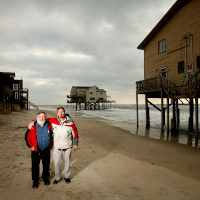
A Traveler's Guide to the End of the World
View the page for this story
1.2 degrees Celsius of global warming is already bringing dangerous climate impacts, and even if the world’s nations come together to keep temperatures from rising beyond 1.5 degrees, we face a troubling and uncertain future. Writer David Gessner tries to grapple with this in his 2023 book, A Traveler’s Guide to the End of the World: Tales of Fire, Wind, and Water, and he joins Host Jenni Doering to discuss a complicated relationship with hope amid a warming world. (13:52)
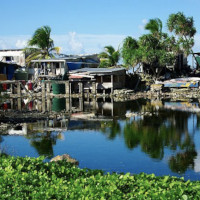
Australia's Climate Visas for Tuvalu
View the page for this story
The tiny island nation of Tuvalu faces inundation from rising seas, and a new treaty would allow a limited number of its citizens to study, work or live in Australia under a climate-related visa program. Abul Rizvi is the former Deputy Secretary of the Dept. of Immigration in Australia, and he joins Host Steve Curwood to explain the geopolitical implications of the deal. (09:58)
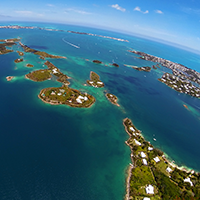
Poetic Plea for The Marshall Islands
View the page for this story
The Marshall Islands’ thousands of residents are extremely vulnerable to climate change. Poet Kathy Jetnil-Kijiner describes life on the island and the threat from rising seas and performs her poem “Tell Them.” (06:47)
Show Credits and Funders
Show Transcript
231208 Transcript
HOSTS: Steve Curwood, Jenni Doering
GUESTS: David Gessner, Derrick Jackson, Abul Rizvi
REPORTERS: Peter Dykstra, Kathy Jetnil-Kijiner
[THEME]
CURWOOD: From PRX – this is Living On Earth.
[THEME]
CURWOOD: I’m Steve Curwood.
DOERING: And I’m Jenni Doering.
House Speaker Mike Johnson has wasted no time in bringing together the divided Republican caucus to pass anti-climate bills.
JACKSON: While these Republican states are garnering three fourths of the renewable energy benefits in manufacturing from the IRA, the legislation would deny the benefits to communities of color and other places that are supposed to be participating in the 'just transition.’
CURWOOD: Also an update from COP28. And, as the seas rise Australia offers climate migration visas to the island nation of Tuvalu.
RIZVI: I think it's a double-edged sword for them. On the one hand it further confirms to them that their nation is in trouble from climate change. On the other hand, at least there is an escape route.
CURWOOD: That and more, this week on Living on Earth. Stick Around!
[NEWSBREAK MUSIC: Boards Of Canada “Zoetrope” from “In A Beautiful Place Out In The Country” (Warp Records 2000)]
[THEME]
House Republicans Oppose Environmental Justice
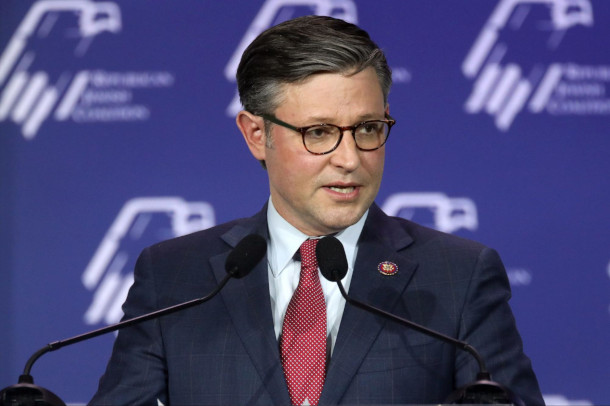
The first bill passed through the House under Speaker Mike Johnson’s leadership aims to cut five to six billion dollars of funding from the Inflation Reduction Act. (Photo: Gage Skidmore, Flickr, CC BY-SA 2.0)
DOERING: From PRX and the Jennifer and Ted Stanley Studios at the University of Massachusetts, Boston this is Living on Earth. I’m Jenni Doering.
CURWOOD: And I’m Steve Curwood.
House Speaker Mike Johnson of Louisiana hasn’t held his new title for long, but he is already trying to slash key legislation enacted in the Biden Administration. The first bill passed in the House under the leadership of the Louisiana Republican aims to gut the 2022 Inflation Reduction Act which included nearly $370 billion in climate and clean energy funding. It would also eliminate the President’s Justice 40 initiative, which mandates that at least 40 percent of the overall benefits from federal climate and infrastructure investments go to underserved communities that have historically borne the brunt of pollution and climate change impacts. Derrick Jackson is a Union of Concerned Scientists Fellow in climate and energy and a contributing opinion writer for Environmental Health News. He’s here to talk to us about how Speaker Johnson is revealing key aspects of the Republican agenda moving forward.
Welcome back to Living on Earth, Derrick!
JACKSON: It's good to be back.
CURWOOD: So we're talking about Republican Mike Johnson of Louisiana, who's been Speaker of the House for just over a month now, Derrick. And you've written opinion pieces about him. Tell me how do you feel about the first bill that passed through the House under his leadership? And what does that bill propose exactly?
JACKSON: First, we should just say that it's a bill that will not likely see the light of day at least right now because it would have to be approved by the Democrats in the Senate and signed by President Biden, which would not happen. That said, it's really interesting to note what the agenda of the GOP is on this. The very first bill that Mike Johnson pushed through the House was one that would gut much of the energy and climate change related aspect projects under the Inflation Reduction Act, five to six billion dollars worth. It would eliminate clean energy and efficiency efforts through the Department of Energy, it defunds a national Climate Corps, it would block funding for state net zero programs. And it would actually stop the government from factoring in the social costs of greenhouse gases.
CURWOOD: Now, to what extent dies Speaker Johnson's bill address the Inflation Reduction Act's funding for communities of color that have disproportionately borne the brunt of pollution?
JACKSON: It basically would gut any support for those communities. What is kind of really extra interesting, as an African American about this, is the very, very blatant fine print, which for me is not fine print, of attacks on programs that clearly would benefit people of color. It would ban funding of the White House's Justice 40 initiative, which would direct the benefits of environmental projects toward communities of color, many of those communities which have disproportionately suffered from pollution and other degradation from the nation's fossil fuel industry and climate change. It would block funding for a more diverse science workforce that would have connections to these communities that might be better positioned to let us know what those communities need. It would block funding for a new national laboratory that will be focused on diverse communities. In fact, it's such a manic fine print, that they would even ban "any discussion of 'critical race theory' in the Department of Energy" and in any aspect of environmental injustice. To me, it's a real, real indicator that they want no historical discussion of why Black and brown communities and indigenous communities have suffered decades and decades of disproportionate environmental impact and toxicity.
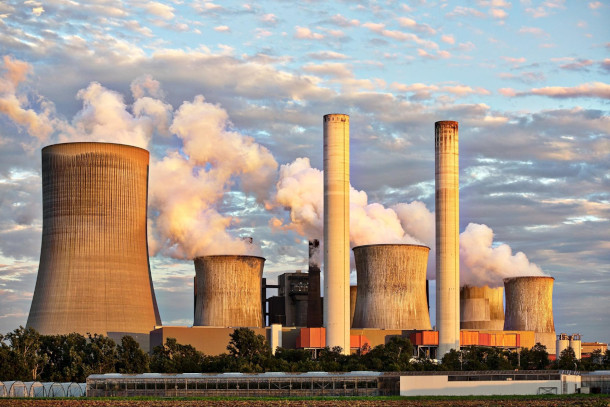
The bill also bans funding of the Biden Administration’s Justice 40 initiative, which would primarily benefit communities of color that disproportionately bear the brunt of pollution. (Photo: Pixabay, Pexels)
CURWOOD: So you're a columnist, you share your opinions. What's your opinion of why?
JACKSON: You know, I think what's interesting about this whole thing is that it really represents a massive hypocrisy of the GOP, because since this very Inflation Reduction Act that they are attacking on the public side, that very IRA has triggered nearly 250 projects of electric vehicle factories, other renewable energy factories, and guess what? It's unleashed about $100 billion of investment right now, 73% of that investment is in states that Donald Trump won, or are controlled by Republican legislatures. In fact, there are three states that have at least $10 billion of this investment: Georgia, South Carolina and North Carolina. And South Carolina is interesting because the former governor and current presidential candidate Nikki Haley condemned the Inflation Reduction act as a "communist manifesto, filled with tax hikes and green subsidies." And there are seven other states with at least a billion dollars of this investment: Alabama, Indiana, Ohio, Oklahoma, Tennessee, Texas and West Virginia. That's not exactly a flaming blue progressive list of states. And so it's a two faced game, Steve, where in public, the GOP says the renewable future is impossible, or we got to go slow and gas and oil have got to be part of the big picture. And at the same time, in private, reaping the benefits. And by the way, this is not a new playbook. Eighty five, eighty six percent of onshore wind farms are in Republican held districts. So this shows that the Republicans really know what the deal is in terms of where the future's got to go in this country. And yet, while these Republican states are garnering three fourths of the renewable energy benefits in manufacturing from the IRA, the legislation would deny the benefits to communities of color, and other places that are supposed to be participating in the "just transition."
CURWOOD: So why would Speaker Johnson want to gut a program that clearly gives Republican states so many benefits? What's going on?
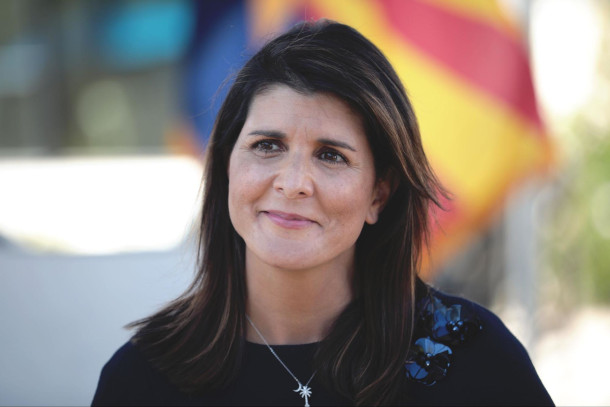
South Carolina’s former governor and current Republican presidential candidate Nikki Haley called the Inflation Reduction Act a “communist manifesto, filled with tax hikes and green subsidies.” (Photo: Gage Skidmore, Flickr, CC BY-SA 2.0)
JACKSON: I think right now it's all show, because I'm absolutely sure he knows that the GOP is getting three fourths of the benefits of the IRA in their districts. I do think that the racial aspects of this bill are very dangerous for 2024. I think that is a symbolic signal to send to the base, that on one hand, we're really happy to take the benefits of the IRA. On the other hand, we're basically putting into law barriers for Black and brown and indigenous communities to get the same benefits. I think it's part of this real, real panic by some sectors of white America, conservative white America, that this nation is rapidly becoming majority of color. And this is part of taking advantage of the future while denying the benefits of the future to other people.
CURWOOD: So to what extent do you think that Speaker Johnson is operating from a racist mindset?
JACKSON: I would say that Johnson represents a mindset, I don't know about him personally, it's not terribly of interest for me to talk about individuals as racist. What I look at is how the system operates. And clearly, when you embed in your legislation several notations that would attack communities of color, and this bill definitely attacks communities of color by denying the history of pollution and denying funds for a diverse workforce, that represents to me leading a systemically racist effort to deny a just transition to those communities.
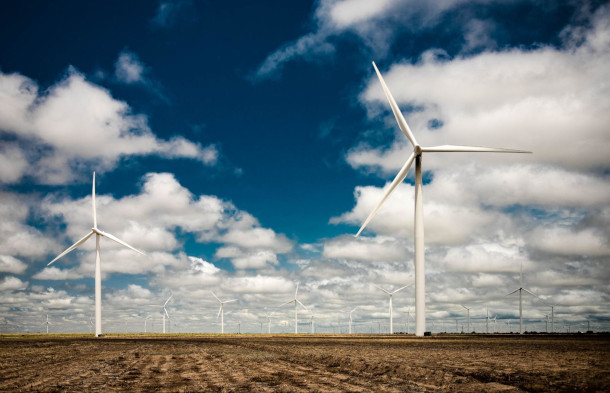
Seventy three percent of investments unleashed by the IRA have been funneled into largely Republican-controlled states. (Photo: Daxis, Flickr, CC BY-ND 2.0)
CURWOOD: So the way the Congress stands, even if this bill, even if this measure that Speaker Johnson has proposed gets passed through the Senate, President Biden has said that he will veto it, right? But what does this tell us about the Republican agenda on climate change moving forward? Why should we be paying attention?
JACKSON: We should absolutely be paying attention because right now, it would not pass. But I think this is a blueprint for a second Trump term. And the first Trump administration has already shown its disdain for any benefits of the just transition going to communities of color, by its attempt to gut many, many EPA laws, and chemical pollution laws. The programs that the Biden White House have tried to do, such as Justice 40, this is really the first administration that really, finally is trying to put some money toward communities that have suffered environmental injustice, all that goes away. All that disappears. So I think this is an important shot across the bow that should not be mistaken by anyone who thinks climate should be a top issue for 2024. And what is really interesting about this, Steve, is that already, there was a major poll this spring where two thirds of Black and Latino respondents said that climate change is a critical issue in the nation's interest. Less than 50% of white respondents say that. And clearly, white respondents are split along party lines. Black and brown people have already spoken, that they want action on climate change. The issue is now whether attempts at legislation like this get some people off the fence, get some white people off the fence, to realize how dangerous this is.

Opinion writer Derrick Jackson says this bill sheds light on what the Republican agenda might look like if former President Trump returns to the White House in 2024. (Photo: Gage Skidmore, Flickr, CC BY-SA 2.0)
CURWOOD: Derrick Jackson is a Union of Concerned Scientists Fellow who blogs on the climate and energy and contributes to Environmental Health News with his opinions. Thanks so much for taking the time with us today.
JACKSON: Thank you for having me on, Steve.
CURWOOD: We reached out to the offices of Speaker Mike Johnson and Republican presidential candidate Nikki Haley for responses but did not hear back from either in time for broadcast.
Related links:
- Read Derrick Jackson’s Blog from the Union of Concerned Scientists
- Read Bill 4394
- Read President Biden’s statement on his plans to Veto Bill 4394
- Learn more about the White House’s Justice40 Initiative
[MUSIC: Allen Toussaint, “Singin’ the Blues on The Bright Mississippi, Nonesuch Records]
DOERING: Coming up, an unflinching look at the risky world we’re leaving our children.
That’s just ahead. Stay tuned to Living on Earth.
ANNOUNCER: Support for Living on Earth comes from Sailors for the Sea and Oceana. Helping boaters race clean, sail green and protect the seas they love. More information @sailorsforthesea.org.
[CUTAWAY MUSIC: Allen Toussaint, “Singin’ the Blues on The Bright Mississippi, Nonesuch Records]
Beyond the Headlines

The sustainable flight took place on a Virgin Atlantic Boeing 787 like the one in the above photo. (Photo: Steve Lynes, Wikimedia Commons, CC BY 2.0)
CURWOOD: It’s Living on Earth, I’m Steve Curwood.
DOERING: And I'm Jenni Doering. And it's time now for a look beyond the headlines with Peter Dykstra, Living on Earth's contributor who joins us from Atlanta, Georgia. Hey there, Peter, what do you got for us this week?
DYKSTRA: Hi, Jenni. We're going to start out with an underground success story. The De Winton's golden mole, an animal that hasn't been spotted in South Africa habitat since 1936. It's been literally sniffed out by a dog. And then researchers using DNA techniques have rediscovered this tiny, shy, hard-to-find creature after almost a century's absence.
DOERING: That is quite a reappearance, Peter, and I took a look at the pictures associated with this reporting. And oh my goodness, this mole is so cute. It's basically just a snout and a big ball of fur. But I don't want to bury the lead, Peter. So let's focus on the hero here.
DYKSTRA: And that would be the dog. It's a border collie named Jessie. This dog has also found more common moles, like the Cape golden mole. And of course, everyone's heard of Grant's golden mole as well, there on the list, but the De Winton's golden mole is back in business after an absence of 90 years.
Researchers in South Africa say they have rediscovered the De Winton's golden mole, a species of mole that had been lost to science since 1936. pic.twitter.com/Um1gZedrLf
— DW News (@dwnews) December 3, 2023
DOERING: Well, I think Jessie deserves extra treats for sniffing out this golden mole that was lost for almost a century.
DYKSTRA: And that would be 700 in dog years.
DOERING: That's right. Well, what else you got for us this week, Peter?
DYKSTRA: There's a plane that made a successful and safe transatlantic trip fueled only by fat and sugar, instead of standard high carbon aviation fuel.
DOERING: Wow, how does this work, Peter?
DYKSTRA: Well, Virgin Atlantic had commissioned this flight. It's called Sustainable Aviation Fuel, or SAF. It could contain a lot of burnable things. In this case, plant sugars and waste fats from restaurants and other cooking entities. After taking off in Europe, it landed at JFK International in New York City. And it's about 70% less carbon emissions than any petroleum- or kerosene-based jet fuel.
DOERING: And I imagine if it's made from fat and plant sugars, does it smell like doughnuts, Peter?
DYKSTRA: It could! I hadn't thought of it quite that way. Or maybe, get a little classier than that, maybe it's a beignet.
DOERING: Well, now that I'm hungry, Peter, what have you got for us in history?
DYKSTRA: December 11, 1980. In response to the Love Canal toxic tragedy, and other huge waste sites discovered in the 70s, Congress passed and President Carter signed the Comprehensive Environmental Response Compensation and Liability Act. When you have an unwieldy title for a law like that, you give them an acronym, and the acronym is CERCLA. And when you have an unwieldy acronym, you give it an adorable nickname. And that's how we got Superfund, the overarching, multi- multi-billion dollar law that mandates cleanups for the most dangerous and toxic sites across the United States.
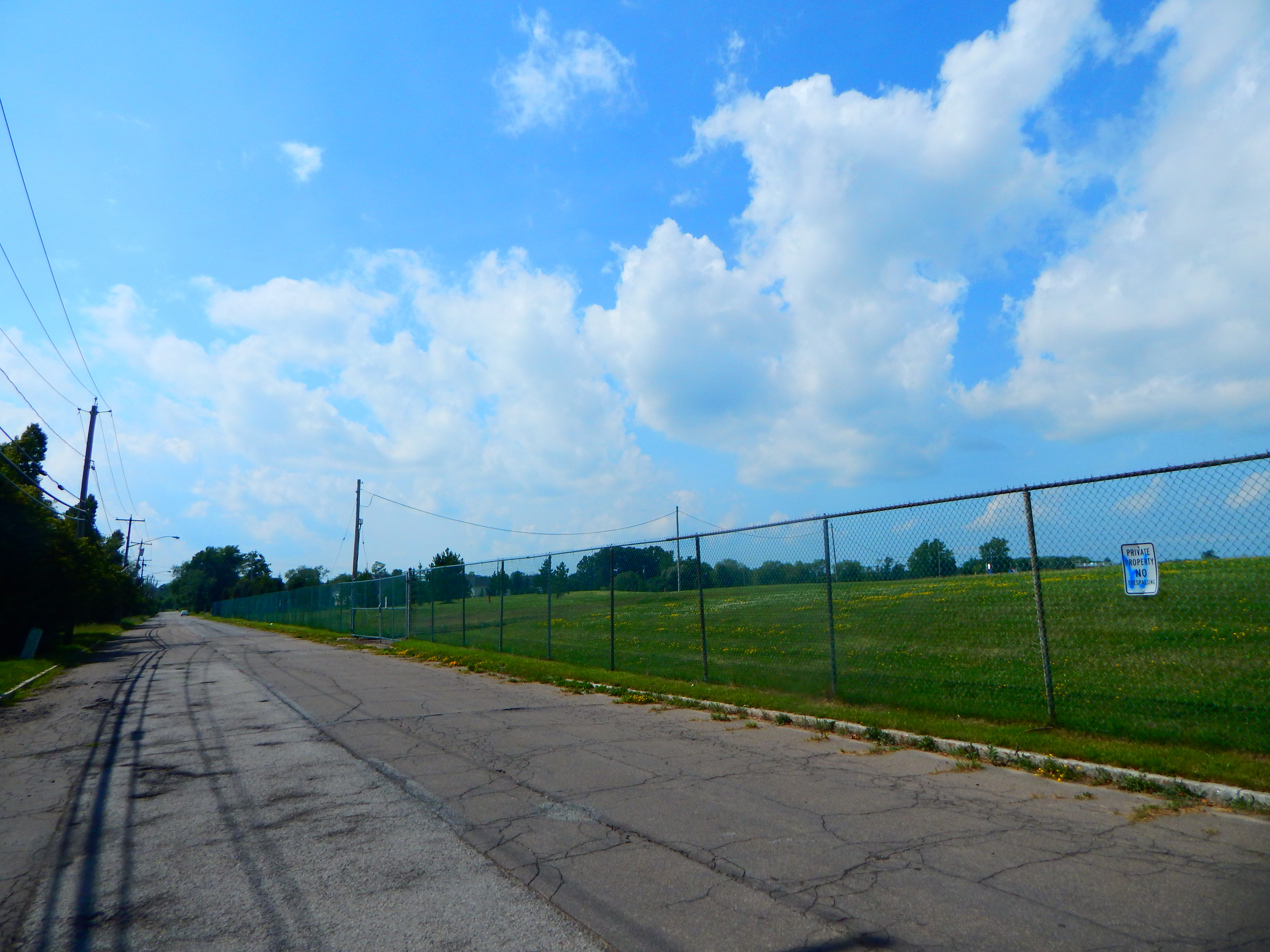
Love Canal was the site of a chemical landfill with such extreme health consequences on the surrounding community that the site inspired the Superfund program. (Photo: Adam Moss, Flickr, CC BY-SA 2.0)
DOERING: Well, I know that Superfund hasn't been perfect, Peter, but it has cleaned up some pretty significant messes.
DYKSTRA: Successes. Yes, it's had a few. But then again, too few to mention. So many Superfund sites still on the list over a thousand, where cleanup is being litigated. But then again, these sites in some cases were cleaned up where there was little hope previously that they would ever be clean.
DOERING: And now with the Biden administration's focus on environmental justice, maybe some of these cleanups can be helping those who need it most. Well, thank you so much, Peter. Peter Dykstra is our Living on Earth contributor and we'll talk to you again next week.
DYKSTRA: Okay, Jenni, we'll talk to you soon.
DOERING: And there's more on these stories on the Living on Earth website. That's LoE.org.
Related links:
- The Washington Post | “A Plane Fueled by Fat and Sugar Has Crossed the Atlantic Ocean.”
- NPR | “Holy Mole-y: A Sniffer Dog Helps Rediscover a Rare Mole.”
- Learn more about the Superfund program
[MUSIC: Allen Toussaint, “Just A Closer Walk With Thee” on The Bright Mississippi, Nonesuch Records]
UN Climate Summit COP 28 Update
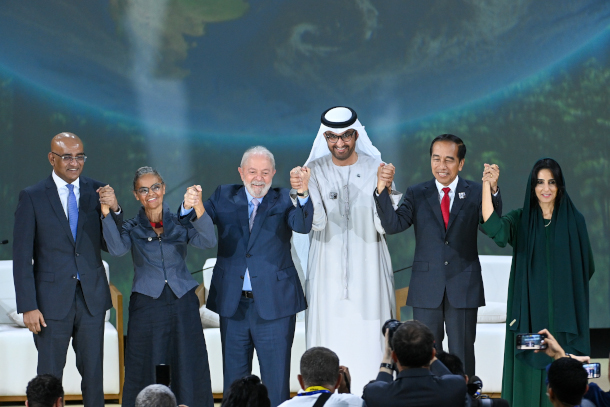
From left: Bharrat Jagdeo, Vice President of Guyana; Brazil’s Minister of the Environment Marina Silva; Brazilian President Luiz Inácio Lula da Silva; His Excellency Dr. Sultan Al Jaber, COP28 President; Indonesian President Joko Widodo; and Razan Al Mubarak, President of the International Union for Conservation of Nature. The leaders gathered on December 2, 2023, during the Nature Session as part of COP28 in Dubai, United Arab Emirates. (Photo: Stuart Wilson, COP28, CC BY-SA 2.0)
CURWOOD: Nearly 100,000 attendees descended into Dubai for the COP28 UN climate summit, where delegates are still trying to come together for the Global Stock take. That’s a progress report on how well the world is working to meet the goals of the 2015 Paris Agreement, which aspires to limit global warming to 1.5 degrees Celsius.
So far more than 110 of the nearly 200 countries at COP28 have agreed to triple renewable energy capacity and double energy efficiency by the end of this decade.
Helena Spiritus is the global lead for oil and gas transition at the World Wildlife Fund.
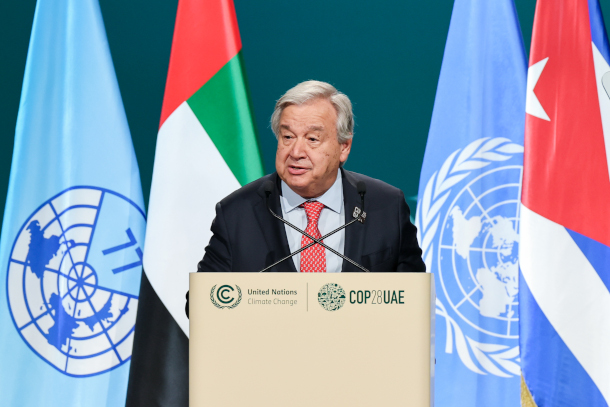
António Guterres, United Nations Secretary-General speaks at the G77 and China Leaders’ Summit during COP28 in Dubai on December 2, 2023. (Photo: Mahmoud Khaled, COP28, CC BY-NC-SA 2.0)
SPIRITUS:. If we are going to keep to 1.5. If we are going to be able to reach our objectives with this cop, we have to see fossil fuels being out of the energy matrix and renewable energies, replacing them in the energy matrix. This has to happen. And at this COP where we finally have energy and fossil fuels at the center stage. We cannot have half measures, we cannot have half words. The science is very clear. What we have to do now and it's very urgent.
DOERING: Another voice is Liane Schalatek who says the COP urgently needs to address the failure to fully fund adaptation for poor countries. She is the Associate Director of the Heinrich Böll Foundation.
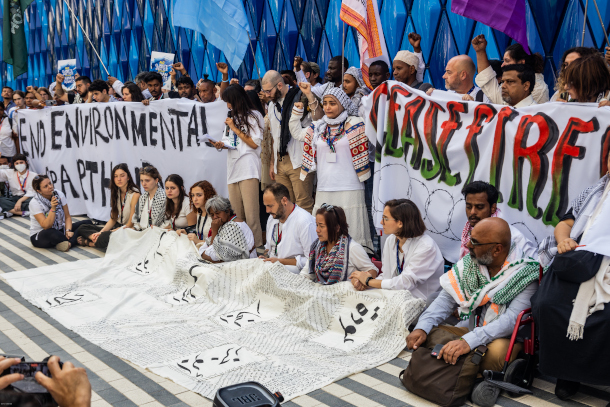
At COP28, some activists and delegates also expressed environmental concerns about the war in Gaza and called for a ceasefire. (Photo: Media Ninja, Flickr, CC BY NC 2.0)
SCHALATEK: What we've seen here is a lack of ambition in finance pledges. Where we need trillions and billions, we've got so far millions. That's inadequate, it's unjust and it's an insult to the communities in the Global South, who need support now, not eventually, and need substantial support, not peanuts.
Related links:
- Learn more about COP28.
- Listen to WWF: COP28 - Week 1 in Review on December 6
- Climate Action Network International press conference on December 6
A Traveler's Guide to the End of the World
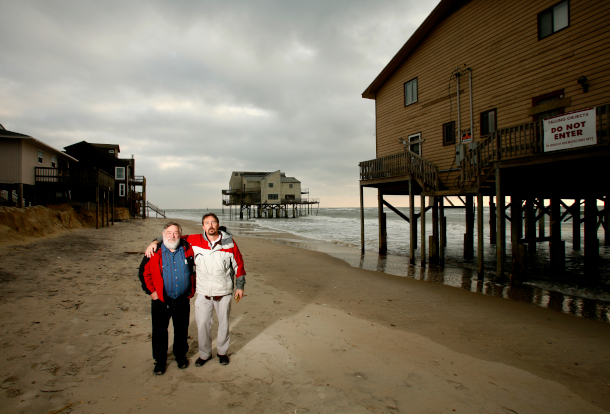
David Gessner and Orrin Pilkey traveled up and down the coast discussing the impacts of the climate crisis on the coastline. (Photo: Coke Whitworth)
DOERING: Earth is already 1.2 degrees Celsius warmer, and without more substantial plans to curb emissions, could soon blow past the 1.5 degree target into an even more perilous world. That’s the scary and uncertain future that writer David Gessner tries to grapple with in his 2023 book, A Traveler’s Guide to the End of the World: Tales of Fire, Wind, and Water. He teaches at University of North Carolina, Wilmington. Hi David, welcome back to Living on Earth!
GESSNER: Thank you. It's great to be back.
DOERING: So the title of your book, A Traveler's Guide to the End of the World, what does the end of the world really mean to you?
GESSNER: First, I should say, I wrote it with a little bit of a wink. Because, you know, years ago, I wrote a book called, "My Green Manifesto." And in it, I said, I'm against all these apocalyptic titles, you know, the doom of the end of, so I said, I'm never going to do that. So of course, I turned around and did it. And, for me, the end of the world, you know, as many people have pointed out, the world will, in all likelihood, carry on different forms. But for me, it is the world that we're starting to see now, an erratic world and a world of species deprivation. A world where it's 80 degrees out in November in North Carolina and where we're still waiting on the potential late season hurricane. The end of the world that we used to know is what the end of the world looks like to me.
DOERING: And tell me about the premise that you set out with to really contemplate what the world might look like, in 42 years, when your daughter is the age that you were when writing this book. Why is that a useful lens?
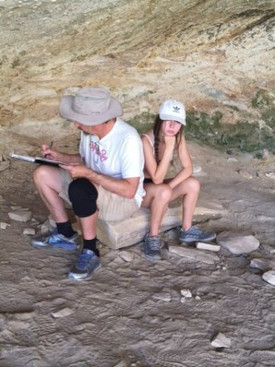
David Gessner was inspired to write The Traveler’s Guide to the End of the World in part by asking himself what the world would be like when his daughter, Hadley, was his age — in 42 years. (Photo: Nina de Gramont)
GESSNER: Well, the book grew from two things. One was accidental, and one was purposeful. And the accidental one was a year after the pandemic, I started traveling again. But everywhere I went, I saw this kind of climate world where we are in the future. So finally, by about the third or fourth thing like that, I was like, I guess this is the book I'm going to write. Simultaneously, my daughter was 18. She seemed to have the activism gene that I lacked and had been running the Sunrise program at her, you know, high school. And so I really started to wonder and try to feel what it would be like when she was my age, which was like 2062, and try to imagine the world that I'm in now is chaotic enough, like try to imagine ahead. And that was the second driver for the book. And I started to ask scientists, wherever I traveled, that question, "Describe for me, the world that we're going to have then." It was kind of like a creative writing project for scientists or an assignment for scientists.
DOERING: Well, and it also seems to speak to this concern, and I think maybe curiosity, that you have about a world that you probably won't be around to see.
GESSNER: Yeah, yeah, exactly. My daughter's name is Hadley, and she's 20 now, and she's at NYU in the Tisch School making movies, which is great. But when people said to me, it hasn't changed or kind of dismissive of this, I bring up her high school years as Exhibit A. Freshman year of high school for her, hurricane Florence hit, we evacuated for a month. And she came back home, and her school was a shelter. Spring term freshman year was her one good term. The next year, Hurricane Dorian hit and we evacuated again. And then, of course, COVID shut things down that spring. And when they did come back, it was punctuated by the occasional school shooting warning. And I was like, "Holy crap, this is a, this is a different world that I grew up in." And you know, really trying to do the work, which is hard to do, even with your own kid, of empathizing and imagining the things that she's going through, not just with this uncertainty, but with the ignoring of the uncertainty. Because that's what you know, when we talk about, we can talk about doomism a little bit, but there are plenty of kids who are just like, "We're screwed, and therefore, we're not going to think about it and carry on with our lives as if it isn't going to happen." So that's an interesting part of it, too. I think.
DOERING: Some of the scenes in this book take place with the geologist, Orrin Pilkey. Can you tell me about what that was like?
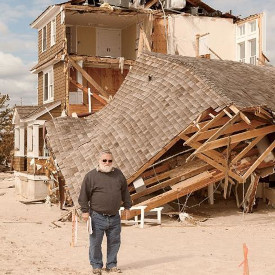
Orrin Pilkey predicts that it will become less viable to build housing along the coast as rising sea levels and increasing hurricanes hit the shores. (Photo: Jeremy Lange)
GESSNER: Well, we moved from Massachusetts to North Carolina in 2003. And my daughter was three months old when we got there. And we were only there a month when Hurricane Isabel hit. So suddenly, I was in this kind of hurricane bullseye. And being a curious person, I wanted to find out more about what living there meant. And I reached out to Orrin Pilkey, who was a coastal geologist at Duke, and he's kind of famously controversial figure down here. He's told people they should move off the beach. Water was coming in and the water was rising, and the beach was eroding, and that it was foolish to build there. And of course, that's the last thing you know, people want to hear. He would go into the science of it the way building these huge houses was like drawing a false line in the sand. And then supporting them with revetments and jetties was even worse because the erosion would occur right up into the land and make it even more dangerous once the wall was broached. So I started traveling the Outer Banks with him and having him teach me about what I was seeing. And ultimately, we headed up after Hurricane Sandy to do kind of a post mortem on the whole coast where Sandy had hit, including the Jersey Shore and going into New York City, where he would point to the subways and, you know, talk about how they became waterfalls during the hurricanes. And so it was a it was an education. And it was an early apocalyptic episode in my, in my climate education.
DOERING: One of the things about being human in this changing world is that we're human. We're living our lives. We're falling in love. We're making each other laugh and creating beautiful art all at the same time, that the world is falling apart. How do you make sense of this paradox?
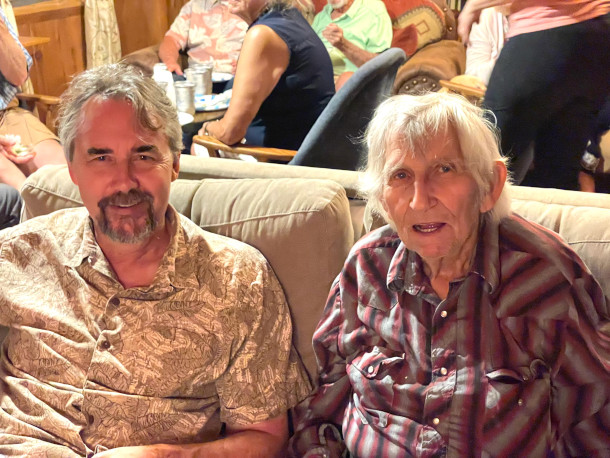
Ken Sleight lost a life’s worth of research when his shop burned by a wildfire, and was then flooded, in 2021. (Photo: ML Lincoln)
GESSNER: I'm really glad you asked that question. And not not too many people have. To me, that's really kind of the crux of the book in a way. In the book, I say, I'm tired of the word hope. I want to check out the word hope. In my life, I rely on hope as a fuel to go from day to day. So there's a contradiction there. But for me, I think that interesting psychology of climate change is the way we've repressed this thing. But I understand why we've repressed it. I mean, we don't walk around all day thinking about our death or our doom. And like you said, with falling in love, we're kind of dealing with our career. We're dealing with today's problems, our things-to-do list. So for me, the interesting part was kind of exploring what that means. And still caring about climate and making a book about it was, in one way, a very practical way for me to think more about climate.
DOERING: We have to talk about climate anxiety because it's something that a lot of us deal with. And maybe most of the time we are repressing what's actually going on with the planet. But then we're confronted with news, like how much ice is melting in Antarctica, and the hurricane that's at your doorstep that you know, forces you to relocate for a month. How do you personally try to grapple with that in your own life?
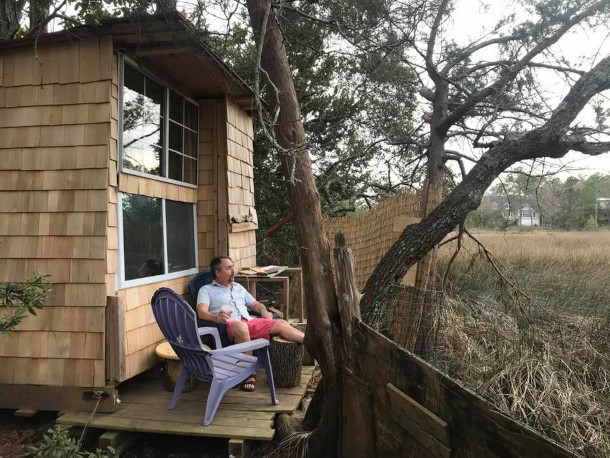
David Gessner spends most of his time writing in his shack. (Photo: Chip Hemingway)
GESSNER: Well, you know, as a writer, you know, years ago, I wrote a book called Sick Of Nature. And I now think that every other book should be called Sick of the Last Book because you obsess for two or three years, and then you turn your back on it. Like last time I was here, I spoke about Teddy Roosevelt. And I haven't done a lot of thinking about Teddy, since. It's almost being like, obsessive, and then switching to the new obsession. And so I will turn away, you know, toward the next subject, at least. The next generation and the generation after aren't going to be quite as lucky. I have a chapter in the book called "Beneath the Ice." And in it, I try to weave three things. It's kind of a triptych. And one of them is exactly what you were talking about the melting of the ice caps. You know, we read that in the news, oh, a chunk, the size of Los Angeles just broke off. And then we kind of go home, on with our things-to-do list. So that's one thread. The other is a trip I did, following the Colorado River to the source and I flew over it, I swam in it, I walked beside it, and finally hiked up to the source where the water flows below the ice. But the third thread was about my mom and her Parkinson's, and being a caretaker for a long time, you know, for half a dozen years, and how it had made me unable to remember my mother before, and unable to have an emotional connection to this person who I, you know, loved above all others when I was young, and who was a great mom, but had become something else. And there was a moment where I listened to "Annie's Song" by John Denver. And all of a sudden something cracks in me, and I'm bawling and having an old school catharsis and it's all throbbing and coming out. And to me, the climate thing is similar. Whether we know it or not, at some deeper level, it's there. And so I guess the question would be, how do we access that enough to care and to act and yet not let it swamp us and overwhelm us with the emotion. And I think that Hadley's generation, you know, that's a lot of it. I have sympathy with people who just go, "I'm turning the other way. I'm putting those blinders on." But I do think something emotional can be gained by turning toward it sometime, particularly for us oldsters who tend to just, you know, go, "Oh, it's not going to be here when we're, you know, we're going to be gone anyway," which is ridiculous. These are our kids. We're supposed to care about them more than ourselves.
DOERING: Now, as with your previous work, David, I honestly laughed out loud at times while reading this, in spite of the fact that it's about the climate crisis. You share being hungover and even trying shrooms and also getting COVID. And I felt throughout that I was getting to really getting to know you. Is that inherent to your writing style or an intentional choice when writing this book in particular?
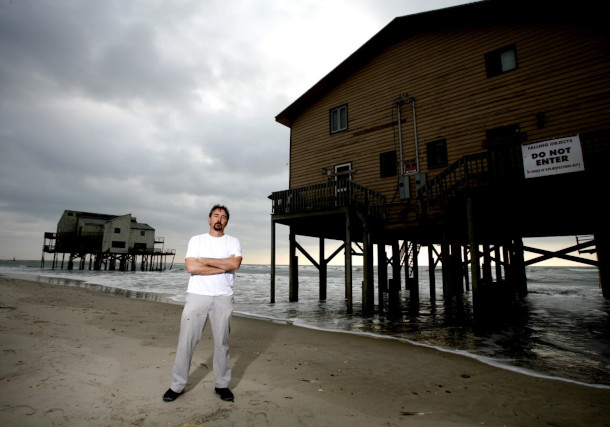
David Gessner is familiar with life on the coast: He lives in hurricane-ridden North Carolina. (Photo: Coke Whitworth)
GESSNER: Yeah I think it is. I mean, in the first page, I say, despite this tour of doom, I'm gonna give you, hopefully, we're gonna have a little fun along the way. You know, I've read writers, like, he's not in favor anymore, but I read writers like Philip Roth and Vonnegut when I was young, and, and, you know, tried to write funny, so that was part of it. But there's another type of writing that I love, which, you know, starts famously with Montaigne and, you know, the 16th century. And it's personal writing where you get the flavor of the narrator, and this autobiographical mode can be helpful, in that I think it humanizes this issue that feels so much like an issue, you know, and it's so treated in one way, so often. I'll say one more thing about the personal thread. This has kind of evolved over time with my work, you know, it was a lot more private, when I started. And it's become more public. I guess, a big moment change for me was going down during the BP oil spill. And everybody warned me and said, people don't want to talk. You know, they're, they're being private, and they're not gonna want to talk about it. Totally the opposite. Everybody wanted to talk. You know, fishermen wanted to talk. People cleaning the beaches wanted to talk. So. So this became a big part of my writing. And it got to the point where I thought the aesthetic of my writing was "a man walks into a bar." I literally did that in Vernal, Utah, when I was writing about all-terrain vehicles and off-road vehicles. I went there to do an article for an environmental magazine. And I got to town, looked around, and there was this bar. And I walked into it, and just started talking to people. And the next morning, I woke up kind of groggy. And I realized I'd made a date to go off road motorcycling with the guy I had met the night before. So I went out. And you know, I rode a motorcycle a couple times when I was a teenager, but I'd never really done it before. And off we went. I wore this kind of shoulder pads and gloves and everything and, and about halfway through, I went flying off one of the red rocks and landed and bruised my ribs and my wrist.
DOERING: Oh.
GESSNER: And I was lying on the ground. And I thought, "this is going to be so perfect for the article."
DOERING: Your relationship with hope is complicated to say the least. What role do you think hope plays in approaching the climate crisis?
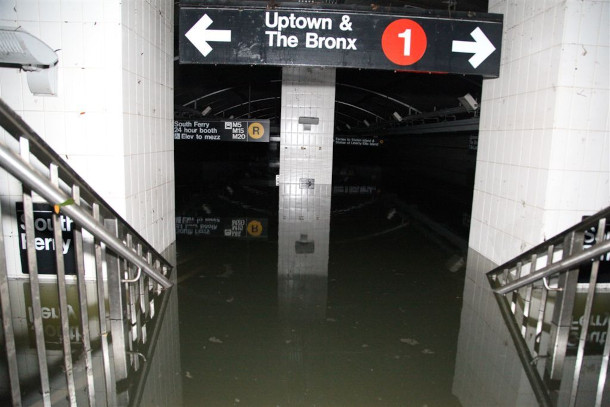
Hurricane Sandy flooded New York City’s subway stations. (Photos: Leonard Wiggins, MTA New York City Transit, CC BY 2.0)
GESSNER: Part of my criticism of hope is my criticism of the cliches of the genre, the tropes of the genre. And it seems that part of the rule is to go hard about the dire state we're in and then give a little glimpse of green and uplift at the end. And you see that most comically in news broadcasts where they kind of treat it superficially. And they'll be you know, like, "Oh, there's 1000 acres that burned over here and, and there's this little green sprig over here. You know, like it's almost that required to that. So I wanted to banish it for this book, you know, too much talk about you know why it needs to be hopeful. I mean, it just seems we're too preoccupied with it. Like I said, I tried to banish it and yet temperamentally, I'm a very hopeful person. And there's a great Samuel Johnson line, "Without hope there is no endeavor." You know, hope is our fuel. Hope is a driver. So I'm not really against hope. I'm against the cliche of hope.
DOERING: David Gesner's latest book is a travelers guide to the end of the world. Thank you so much, David.
GESSNER: Thank you so much.
Related links:
- Purchase A Traveler’s Guide to the End of the World: Tales of Fire, Wind, and Water (Affiliate link helps donate to LOE and local indie bookstores)
- Explore more of Gessner’s work
- Read an op-ed by Orrin H. Pilkey, PhD about the dangers of coastal development.
[MUSIC: Lawrence Blatt, “Standing in the Rain” on Out of the Woodwork (New Edition), Lmb Music]
CURWOOD: Just ahead, as global warming raises the seas Australia offers a lifeboat to residents of the low-lying Pacific Island nation of Tuvalu. Keep listening to Living on Earth.
ANNOUNCER: Support for Living on Earth comes from Friends of Smeagull the Seagull and Smeagull’s Guide to Wildlife. It’s all about the wildlife right next door to you! That’s Smeagull, S - M - E - A - G - U - L - L, SmeagullGuide.org.
[CUTAWAY MUSIC: Lawrence Blatt, “Standing in the Rain” on Out of the Woodwork (New Edition), Lmb Music]
Australia's Climate Visas for Tuvalu
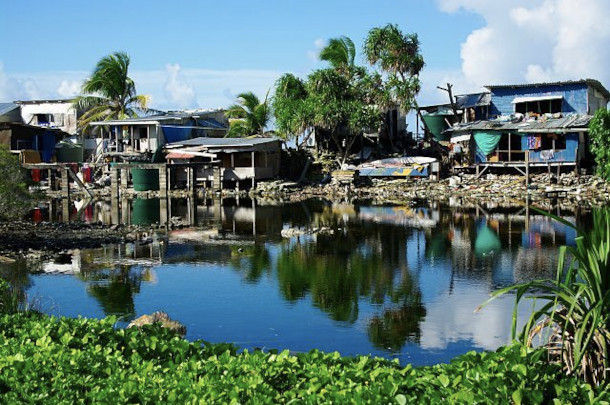
Tuvalu is a small Pacific Island nation nearly at sea level. (Photo: INABA Tomoaki, Wikimedia Commons, Fair Use)
DOERING: It’s Living on Earth, I’m Jenni Doering
CURWOOD: And I’m Steve Curwood.
The tiny Pacific Island nation of Tuvalu has signed a treaty with Australia that would create a new climate -related visa. It would allow a limited number of Tuvaluans to study, work or live in Australia as their homeland faces inundation from rising seas. The treaty, called the Falepili Union would admit 280 Tuvaluans each year, ranging from professionals to agricultural workers. It was signed by Australian Prime Minister Anthony Albanese and Tuvaluan Prime Minister Kausea Natano on November 10. But former PM Enele Sopoaga has vowed to negate the deal if he wins his old job back after the Tulvalu elections in January. For more, we turn now to Abul Rizvi who is the Former Deputy Secretary of the Department of Immigration in Australia. Welcome to Living on Earth Abul!
RIZVI: Thank you, Steve.
CURWOOD: We're recording this during cop 28, the UN Framework Convention on Climate Change negotiations, which has moved forward with a loss and damage program. And people know that Tuvalu is pretty much at sea level and expected to vanish beneath the waves, if any of the predictions that the scientists have given us come true. So what do you make of the fact that Australia is willing to talk directly about the impact of climate and the need to reach out to your neighbors there to help them with what's coming?
RIZVI: I think it's a very significant step, I think, for Australia to have done this. And I'm not aware of many other countries that actually have visa programs directly linked to climate. Having said that, I think it's important to remember that the objective of this visa is not solely climate, it is also very much about geopolitical issues in this space. And it is also about attracting agricultural workers to Australia. So it's designed to do three things, not just the one. But nevertheless, the fact that climate is explicitly mentioned is very significant.
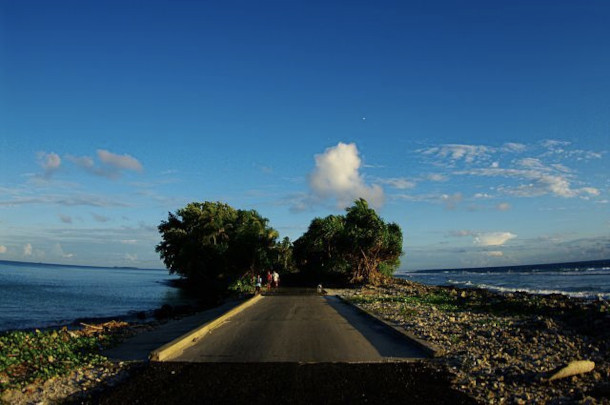
The ocean is never far in Tuvalu. (Photo: INABA Tomoaki, Wikimedia Commons, Fair Use)
CURWOOD: Now, I understand that Australia and Tuvalu have yet to formally approve this question of, of a visa and the terms of it and I gathered, there are some security aspects to this proposal that play into the geopolitical situation that you allude to. So what's up here? How might elections impact the notion of having this union come together with these visas?
RIZVI: I think from Tuvalu’s perspective, the key constraint being placed on it by this agreement, is that before Tuvalu can enter into any security agreements any infrastructure development agreements, anything like that with another nation like China Tuvalu must first consult Australia. And in that sense, Tuvalu citizens may view this as something of a restriction on their sovereignty.
CURWOOD: What are the politics of that? How does the Tuvalu view Australia? How does Tuvalu view China? And what might make them hesitate to say, “Well, you know, we really do want the freedom to pick”?
RIZVI: I think Tuvalu may well look across at the experience of its neighbors in the Solomon Islands, where the government in the Solomon Islands has switched between its support arrangements with Taiwan to arrangements with China. What Australia will want is that Tuvalu, does not do the same.
CURWOOD: In recent decades, the Australian government has swung from one type of party to another kind of back and forth, though we've seen this in terms of climate action. One government is interested in taking a lot of action. The other says, let's dig more coal. How vulnerable is this visa to swings in the political divide that you have there?
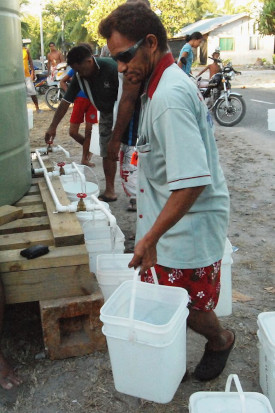
In 2011, Tuvalu experienced a drought so intense that public water collection points were set up. (Photo: The Department of Foreign Affairs and Trade, Wikimedia Commons, Fair Use)
RIZVI: There is some vulnerability there. One thing about this visa is that it is designed to increase Australia's geopolitical influence and counter China. The opposition in Australia is obsessed about countering China far more than the current government. And if this arrangement was to be abandoned under a change of government and Tuvalu did embrace China, the opposition in Australia would have egg on its face. And I don't think it would be prepared to go down that path.
CURWOOD: And when you say, by the way, what Australia will want. I know that the United States has been deeply engaged with the Pacific Alliance that includes the UK, and Australia and New Zealand. I mean, how much pressure Do you think there's actually indirectly coming from the US that the small island state be, well, let's use the word blocked from making a deal with China?
RIZVI: I think it's entirely in the United States interests for China to be limited in its ability to infiltrate into the Pacific, I think Australia and the United States interest in that are quite aligned. But both the United States and Australia in terms of their relationship with China seems to be evolving. There was a much more tense relationship, perhaps a couple of years ago. There has been some cooling off in the last year or so.
CURWOOD: So describe to us please the role that Australia plays in Pacific Island migration these days.
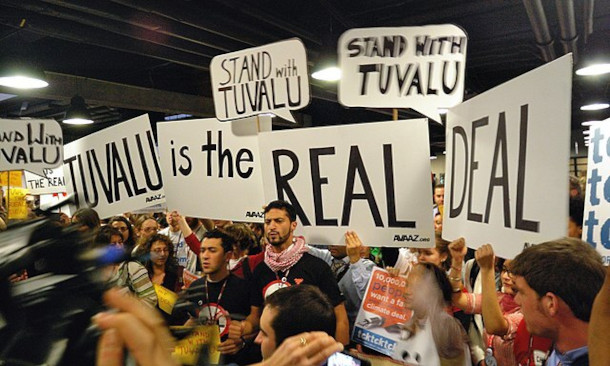
During COP15 in 2009 demonstrators protested for new protocols to reduce global emissions from larger countries. (Photo: Lauri Myllyvirta, Wikimedia Commons, Fair Use)
RIZVI: So Australia's role in Pacific Island migration has increased quite significantly in the last decade. Prior to that, Australia had very little links in terms of migration from Pacific islands apart from New Zealand, New Zealand had much more extensive arrangements with the Pacific and has had those for much longer than Australia. But Australia's arrangements now are not without their difficulties. And the difficulties are very similar to the difficulties that all agriculture visas have had, both in North America and in Europe. Essentially, what has happened in those two regions of the world with agriculture visas, is there's been a whole high level of exploitation of the workers, workers being underpaid, poorly treated, forced to work in very, very, extremely hot conditions, working long hours for poor pay. The concern is that situation is being replicated in Australia, even though Australia knew of those problems, had a view that it had enough protections for the workers in place. The evidence is now suggesting that perhaps the protections were not enough. And Australia is experiencing the same issues as North America and Europe with agricultural workers.
CURWOOD: So to what extent are their monies attached to this proposal that would say send to Tuvaluans to school to get a better education, whether it's in health care or it or the things in the modern society?
RIZVI: I very much hope there is money that the Australian Government will put up to assist Tuvalu citizens acquire those skills. We haven't seen those details, as the Australian government considers itself in a very tight budgetary situation, whether it's prepared to be generous in that regard or not, I don't know. But I would be strongly encouraging the Australian Government to be generous with skills development, to ensure we don't end up with the same problems with this visa as we've had with other visas.
CURWOOD: So at the moment, there's really no international legal definition of a climate refugee, and therefore very few protections for those who are forced to leave their homes due to climate related disasters or changes. To what extent does this visa program impact future rights for climate refugees, not just in Australia, not just in Tuvalu, but around the world?
RIZVI: I think this is a cutting edge visa. And it may well help other countries think about this more deeply. Having said that, I would be very surprised if there could be success in changing the 1951 definition of refugee. The level of agreement across so many countries required would be just extraordinarily difficult and painfully slow.
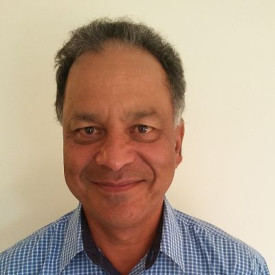
Abul Rizvi is the former Deputy Secretary for Australia’s Department of Immigration, having served in that role for over 20 years. (Photo: Courtesy of Abul Rizvi)
CURWOOD: To what extent do other countries, other rich countries who have used lots of carbon based fuels to make themselves rich. To what extent do they really need to look hard at developing visas for people who can't live in the places that they currently live because of rising seas?
RIZVI: I think they absolutely need to look at those visas. And I think it's good, Australia has started down that path. And I think many countries will look at Australia's experience, what it gets right, what it gets wrong, and they hopefully do take action in those areas. But what's happening across North America, across parts of South America, across Europe, in terms of the treatment of refugees, none of that is really improving. It's, it's getting tighter, harder, more punitive. And given that development, I fear that from a climate perspective, many nations will close their hearts in this space. Certainly, if you look at the authoritarian leaders that have emerged in Europe, may emerge again or return in the United States and what's happening indeed in Canada, in places such as Argentina, I don't see a lot of sympathy for refugees in those circumstances.
CURWOOD: Anyone who asked to leave their ancestral homeland is likely to have a very painful experience, feel traumatized and, and really are only going to do this as a last resort. So to the extent you have insight into this, how are the Tuvaluans reacting to the news of the possibility of these visas?
RIZVI: I think it's a double-edged sword for them. On the one hand, it further confirms to them that their nation is in trouble from climate change. On the other hand, at least there is an escape route. And I think they will see that as a positive and they will hopefully view Australia positively in that regard. I'm sure that's what Australia is intending or hoping for.
CURWOOD: Well, I want to thank you for taking the time with me today. Abul Rizvi is the former Deputy Secretary of the Department of Immigration in Australia.
RIZVI: Very enjoyable. Thank you very much.
Related links:
- RNZ | ”Australia-Tuvalu Falepili Union 'Shameful' - Former Tuvalu PM”
- Prime Minister of Australia | ”Joint Statement on the Falepili Union between Tuvalu and Australia”
- Time | “Australia Signs Historic Climate Refuge and Security Pact with Tuvalu”
- UNSW Sydney | “Australia's Offer of Climate Migration to Tuvalu Residents is Groundbreaking - and Could Be a Lifeline Across the Pacific.”
- The Guardian | “Copenhagen Talks Break Down as Developing Nations Split Over 'Tuvalu' Protocol"
- Short Biography for Abul Rizvi
- Read Abul Rizvi's latest work on Net Migration
[MUSIC: Jan Johansson, “Visa fran Utanmyra” on Jazz Pa Svenska, Heptagon Records]
Poetic Plea for The Marshall Islands
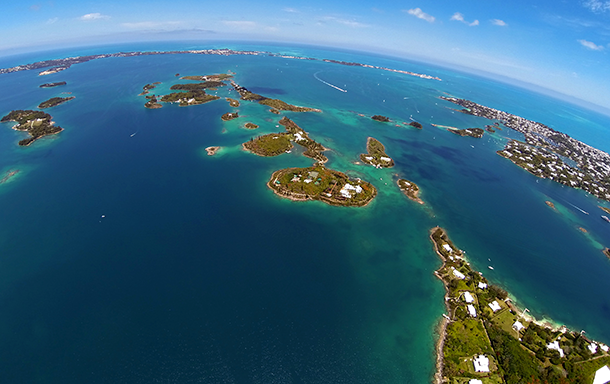
The Marshall Islands are threatened by rising seas. (Photo: BermudaMike, Flickr CC BY-NC-ND 2.0)
DOERING: Small island states like Tuvalu have long demanded action to curb global warming gas emissions at the United Nations, no more prominently than at the 2015 COP when the Paris Agreement was forged. Now, as costly climate impacts intensify, these vulnerable nations are hoping to receive a financial lifeline from the new loss and damage fund that was brought into existence on the first day of COP28. Those funds are essential if there is to be any hope of shoring up these island nations against rising seas and intensifying storms. Unlike Tuvaluans, Marshall Islanders have the right to come to the United States without a visa and stay as long as they like. It is partial compensation for the US using Bikini Atoll and other parts of the Marshall Islands for hydrogen and atom bomb testing during the Nineteen Forties and Fifties, a different kind of loss and damage. At COP21 in Paris, a poet from the Marshall Islands celebrated her native land, and warned of what would be lost if her home were to slip beneath the waves. Her words still resonate.
JETNIL-KIJINER: My name is Kathy Jetnil-Kijiner, I’m from the Marshall Islands. The Marshall Islands is in the Northern Pacific Ocean and it's in an area called Micronesia. It's a small country, it's not very developed. You know, there's just one road, like just one main road, running through the entire island. There's no traffic lights, there’s no malls, there’s no Burger King, MacDonald’s, none of that happens there. It's very very flat, there's no mountains at all, it’s just ocean all around you, which I heard people say that kind of scares them.
[SOUND OF GENTLE WAVES]
It freaks them out when they're first there, like everywhere you turn you see the ocean. And there's coconut trees. Some parts are really lush and beautiful, some parts are not. Our people were known to be canoe navigators, we're also known to be really fine mat weavers. And there's just kids everywhere.
[SOUNDS OF KIDS PLAYING AND WAVES]
You just see kids running around all over the place. Basically, Marshall Islands is only one meter above sea level and so we're extremely vulnerable to the rising sea level. And so we’re extremely vulnerable to the rising sea level. We have these things called, like, sea walls, which are walls we built to keep the ocean out of their homes, and recently we've been having multiple floodings. Just within this year alone, we've had four breaches ... water being so high that it would crash into our homes, destroy, completely obliterate and destroy homes, like completely level it out.
I was out two weekends ago, you know, running errands, and I saw these women and children fundraising with a car wash and BBQ plates, and so I went to buy a BBQ plate. And I said, "What are you fundraising for?" And the women, said, “Our sea walls are broken,” and I was like, "Oh, from the recent flooding?" And they said, “Yes, just the recent one. It broke all of our sea walls." It was a whole community of houses whose sea walls were broken. And they sent me all of these photos, you know, of these completely messed up sea walls, parts of their houses just like totally messed up. And you know, they're not rich, these people. They're having to figure out ways to fix their sea walls, raise funds. Our minimum wage is $2 dollars an hour. And so we're already struggling as it is, as a people, you know, as a country. But then, we have climate change on top of this and it just exacerbates the situation.
I'm a poet and a performer. I'm actually here with the Global Call for Climate Action. GCCA brought me and four other poets out here for the Spoken Word for the World project to raise awareness on various issues on climate change. Our poetry is meant to bring the humanity back into the issues that we're discussing.
TELL THEM
I prepared the package
for my friends in the States
First, the dangling earrings woven
into half-moons, black pearls glinting
like an eye in the storm of tight spirals
Second, the baskets
sturdy, also woven
brown cowrie shell shiny
intricate mandalas
shaped by calloused fingers
Inside the basket
I write a message:
wear these earrings
to parties
to classes and meetings
to the corner store, the grocery store
or while riding the bus
Store jewelry, incense, copper coins
and curling letters like this one
in this basket
And when others ask you
where you got this
you tell them
they're from the Marshall Islands
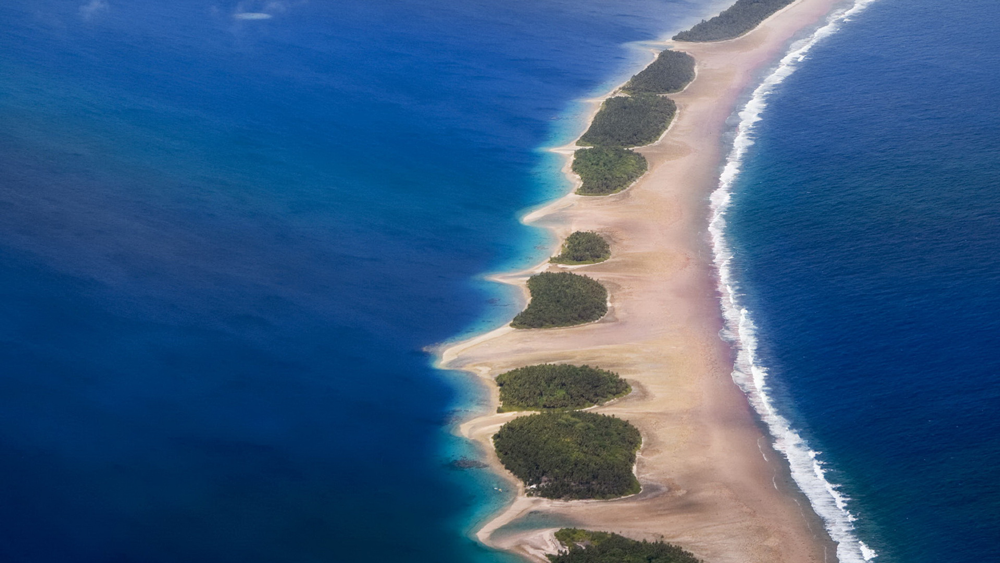
The Marshall Islands are comprised of 1,156 islands and islets. (Photo: Keith Polya, CC BY 2.0)
show them where it is on a map
tell them we are a proud people
toasted dark brown as the carved ribs
of a tree stump
tell them we are descendants
of the finest navigators in the world
tell them our islands were dropped
from a basket
carried by a giant
tell them we are the hollow hulls
of canoes as fast as the wind
slicing through the Pacific sea
we are wood shavings
and drying Pandanus leaves
and sticky bwiros at kemems
tell them we are sweet harmonies
of mothers, aunties, sisters
songs late into night
tell them we are whispered prayers
the breath of God
a crown of fuchsia flowers encircling
Auntie Mary’s white sea-foam hair
tell them we are styrofoam cups of Kool-Aid red
waiting patiently for the ilomij
we are papaya-golden sunsets bleeding
into a glittering, open sea
we are skies uncluttered
majestic and sweeping in their landscape
tell them we are dusty rubber slippers
swiped
from concrete doorsteps
we are the ripped seams
and the broken door handles of taxis
we are sweaty hands shaking another sweaty hand in heat
tell them
we are days
and nights hotter
than anything you can imagine
tell them we are little girls with braids
cartwheeling beneath the rain
tell them we are shards of broken beer bottles
burrowed beneath fine white sand
we are children flinging
like rubber bands
across a road clogged with chugging cars
tell them
we only have one road
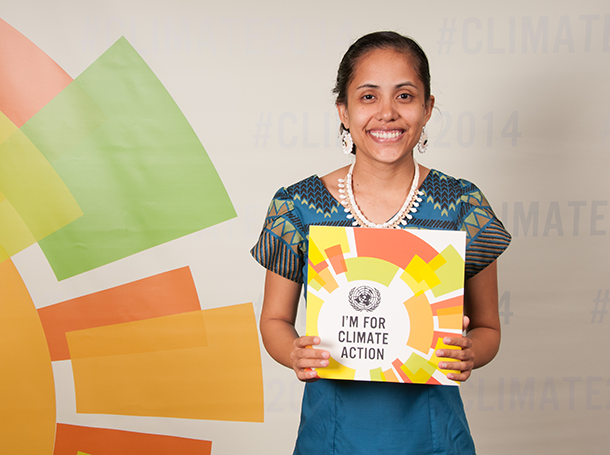
Kathy Jetnil-Kijiner is a Marshallese poet, writer, performance artist, and journalist. (Photo: Simon Ruf/UN Social Media Team, Flickr CC BY-ND 2.0)
and after all this
you tell them about the water
tell them how you have seen it rising
flooding across our cemeteries
gushing over our seawalls
and crashing against our homes
tell them what it's like
to see the entire ocean level with the land
tell them
we are afraid
tell them we don't know
of the politics
or the science
but we see
what's in our own backyard
tell them some of us
are old fishermen who believe that God
made us a promise
tell them some of us
are a little bit more skeptical
but most importantly you tell them
that we don't want to leave
that we've never wanted to leave
and that we
are nothing without our islands.
DOERING: Marshall Islands poet Kathy Jetnil-Kijiner with her poem, "Tell them," recorded at the 2015 Paris Climate Conference.
Related links:
- More spoken word poetry by Kathy Jetnil-Kijiner
- NBC: Pacific Islander Poets Use Art, Stories to Urge Climate Action at UN Conference
- The New York Times: The Marshall Islands Are Disappearing
- LiveScience: Was Darwin Wrong About Coral Atolls?
[MUSIC: Jan Johansson, “Visa fran Utanmyra” on Jazz Pa Svenska, Heptagon Records]
CURWOOD: Next week on the show, author Sy Montgomery returns with another animal-inspired adventure with her book Of Time and Turtles, that’s next week on Living on Earth.
[MUSIC: Soul Jazz Express, “Couple A Brownies” on Soul Jazz Express, Soul Jazz Express]
CURWOOD: Living on Earth is produced by the World Media Foundation. Our crew includes Naomi Arenberg, Paloma Beltran, Josh Croom, Swayam Gagneja, Mattie Hibbs, Mazzi Ingram, Mark Kausch, Mark Seth Lender, Don Lyman, Sarah Mahaney, Aynsley O’Neill, Sophia Pandelidis, Jake Rego, El Wilson, and Jolanda Omari.
DOERING: Tom Tiger engineered our show. Alison Lirish Dean composed our themes. You can hear us anytime at L-O-E dot org, Apple Podcasts and Google Podcasts, and like us, please, on our Facebook page - Living on Earth. We tweet from @livingonearth. And find us on Instagram at livingonearthradio. And you can write to us at comments at loe dot org. I’m Jenni Doering.
CURWOOD: And I’m Steve Curwood. Thanks for listening!
ANNOUNCER: Funding for Living on Earth comes from you, our listeners, and from the University of Massachusetts, Boston, in association with its School for the Environment, developing the next generation of environmental leaders. And from the Grantham Foundation for the protection of the environment, supporting strategic communications and collaboration in solving the world’s most pressing environmental problems.
ANNOUNCER 2: PRX.
Living on Earth wants to hear from you!
Living on Earth
62 Calef Highway, Suite 212
Lee, NH 03861
Telephone: 617-287-4121
E-mail: comments@loe.org
Newsletter [Click here]
Donate to Living on Earth!
Living on Earth is an independent media program and relies entirely on contributions from listeners and institutions supporting public service. Please donate now to preserve an independent environmental voice.
NewsletterLiving on Earth offers a weekly delivery of the show's rundown to your mailbox. Sign up for our newsletter today!
 Sailors For The Sea: Be the change you want to sea.
Sailors For The Sea: Be the change you want to sea.
 The Grantham Foundation for the Protection of the Environment: Committed to protecting and improving the health of the global environment.
The Grantham Foundation for the Protection of the Environment: Committed to protecting and improving the health of the global environment.
 Contribute to Living on Earth and receive, as our gift to you, an archival print of one of Mark Seth Lender's extraordinary wildlife photographs. Follow the link to see Mark's current collection of photographs.
Contribute to Living on Earth and receive, as our gift to you, an archival print of one of Mark Seth Lender's extraordinary wildlife photographs. Follow the link to see Mark's current collection of photographs.
 Buy a signed copy of Mark Seth Lender's book Smeagull the Seagull & support Living on Earth
Buy a signed copy of Mark Seth Lender's book Smeagull the Seagull & support Living on Earth

